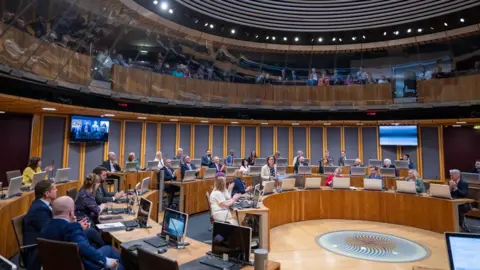[ad_1]
 Senedd Cymru
Senedd CymruThe public could be given the chance to boot badly-behaving politicians out of the Senedd under new proposals.
Unlike MPs in Westminster, politicians in the Welsh Parliament do not face losing their seat if they are found to have breached rules on behaviour.
That proved controversial earlier this year when a Senedd member was suspended for six weeks which, had he been an MP, would have triggered a recall petition.
The Senedd’s standards committee is looking at whether a similar system could be introduced when the institution grows in size at the next election in 2026.
However, while Westminster MPs who are recalled have to fight a by-election, these will not be permitted under the new Senedd voting system for 2026.
Since 2016, MPs who are suspended from the Commons for 10 days or more are subject to a procedure called recall.
It means that a petition is held in their local constituency. If 10% or more of local voters sign it, a by-election is triggered where the politician could chose to defend their seat.
They can also be recalled if they are given a prison sentence of less than 12 months – any longer than that and they are disqualified outright.
Earlier this year Plaid Cymru MP Ben Lake said that his former party colleague in the Senedd, Rhys ab Owen, should have been threatened with a by-election after he was banned from the parliament for 42 days for inappropriate behaviour towards two women on a night out.

Mr ab Owen, who later apologised and has been expelled by Plaid Cymru, remains a member of the Senedd for South Wales Central.
Chris Davies, former MP for Brecon and Radnor, was the first and only politician in Wales to have lost a recall petition in 2019, and a subsequent by-election.
He had admitted two charges of a making a false expenses claim.
The idea of a recall system has cross-party support in the Senedd, but the Welsh government did not include it in its law to expand the size of the Senedd from 60 politicians to 96.
A complication is that the new electoral system will elect politicians from party lists, based on the proportion of the vote they get.
 Senedd
SeneddThe proportional system does not allow for by-elections, and so the committee has looked at options that would see a candidate replaced by the next available candidate on the party list.
That way, the committee says the proportional share of the parties in the Senedd would remain the same, reflecting how people had voted at the last election.
Committee members are evaluating different processes to achieve this, including one that would allow members to campaign to defend their position.
Members are also looking for comments on whether an alternative system could be explored, and how big the threshold should be for a petition.
In addition to this, the committee is consulting on proposals on how the Senedd could disqualify individuals from the parliament for lying – following a commitment by the government to implement such rules.
The committee’s consultation ends on 27 September.
[ad_2]
Source link




